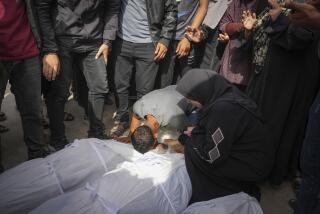Palestinians Schedule Votes for Presidency, Legislature
- Share via
JERICHO, West Bank — Palestinians will elect a president and legislative council in January, a senior official announced Wednesday just two days after President Bush made Palestinian statehood contingent on the selection of new leaders.
Palestinians are moving forward with the elections and government reforms, which were also announced Wednesday, out of self-interest and not because of U.S. or Israeli pressure, insisted Saeb Erekat, the minister for local government.
“Many of you may think: Are we submitting this or saying this in response to President Bush’s speech?” Erekat said during a news conference here in the only major West Bank city not recently reoccupied by the Israeli army. “We are saying this in response to Palestinian needs. We’re saying this because we have been working on this reform for months.”
Shortly after Erekat made his announcement, another senior minister, Nabil Shaath, speaking to reporters in London, said that Palestinian Authority President Yasser Arafat would run for reelection. At the moment, Arafat faces no serious challenger, although a 53-year-old political scientist, Abdel Sattar Qassem, has announced that he plans to run.
Palestinian officials expressed hope that the international community would pressure Israel to withdraw its troops from Palestinian areas to allow the reforms to be implemented and the preparations for the elections to be made.
But the army tightened its grip Wednesday on seven cities and numerous towns and villages reoccupied in the last week after a pair of suicide bombings that killed 26 Israelis. About 800,000 residents remained under curfew. Palestinians reported that troops enforcing a curfew in the northern West Bank city of Jenin shot to death a 7-year-old boy. The army said it was investigating the incident.
In Hebron, the army said that about 150 Palestinians surrendered to troops who have surrounded the Palestinian Authority’s area headquarters there.
Writing in the Israeli daily Haaretz, military correspondent Amos Harel said commanders across the West Bank had been told to “take your time” and count on staying inside Palestinian-controlled areas for an extended period.
Erekat said Arafat intends to hold presidential and legislative elections some time between Jan. 10 and Jan. 20. Municipal elections will be held in March, he said.
But he stressed that Palestinians would be hard-pressed either to carry out government reforms or to conduct elections as long as Israeli troops remain in control of most of the West Bank.
Arafat had wanted to announce the blueprint for reforms himself, Erekat noted, but could not do so because he is besieged by Israeli tanks and troops in his Ramallah headquarters. The task fell to Erekat “because I am the only Palestinian official who can still travel from his home to his office,” the minister said.
A committee appointed by Arafat has devised a plan to streamline the security services, strengthen the judiciary and make the financing of the Palestinian Authority more accountable, and Arafat has approved the recommendations, Erekat said.
Both the Interior and Finance ministries would be restructured and “modernized,” according to the plan. Security services would be brought under the Interior Ministry’s purview, which would “deal with the negative phenomena arising from lack of discipline within the security services,” the plan says.
All Palestinian Authority income would be controlled by the Finance Ministry in an effort to keep closer track of tax receipts, money from donor countries and other funds.
If implemented, the reforms would represent a sweeping reorganization of the Palestinian government.
The question is, Erekat said, “will we be allowed to carry out [these efforts] while [Israeli Prime Minister Ariel] Sharon continues his endgame of destroying the Palestinian Authority?”
Both Israeli officials and Palestinians who support reforms expressed doubt that the Palestinian Authority is serious about implementing the plan. A spokesman for Sharon said that real political change and elections could come only after Arafat cracks down on militants.
“I don’t see how there can be free elections when a reign of terror rules the streets, when armed gangs dictate the Palestinian political agenda,” said Raanan Gissin, the prime minister’s spokesman. “You can’t have reforming elections without reforming the essence of the Palestinian Authority, when Hamas and Islamic Jihad are in the streets.”
Hussam Khader, a member of the Palestinian Legislative Council and a dissident leader of Arafat’s Fatah movement, said that the plan to reform the government and hold elections is meant to solidify Arafat’s grip on power.
“This leadership, which is totally against reforms and elections, now believes in reforms and elections,” Khader said. “It believes in these things only because it feels threatened.”
Khader said dissidents and gunmen who have battled Israeli troops and attacked Israeli civilians are in disarray after nearly two years of fighting, but that Arafat and his key aides remain firmly in power.
“Elections will bring out the traditional leadership, the families to vote for their people,” he said. “We’re bound to see the return of the traditional leadership rather than the rise of a progressive, new leadership.”
There is near consensus among Palestinians that Arafat, who has led the Palestine Liberation Organization for more than three decades and was elected president of the Palestinian Authority in 1996, will easily win reelection despite increasingly public criticism of his policies among his people.
But Erekat said that any Palestinian 35 or older is free to run for the presidency. He said that any Palestinian political group, including Hamas and Islamic Jihad, would be welcome to participate.
More to Read
Sign up for Essential California
The most important California stories and recommendations in your inbox every morning.
You may occasionally receive promotional content from the Los Angeles Times.













